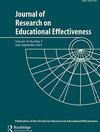当使用观察系统作为教学干预的结果测量时,解决仪器偏差的框架
IF 1.6
4区 教育学
Q2 EDUCATION & EDUCATIONAL RESEARCH
Journal of Research on Educational Effectiveness
Pub Date : 2022-06-17
DOI:10.1080/19345747.2022.2081275
引用次数: 2
摘要
摘要许多教育干预措施都试图改变教师的教学实践。基于标准的观察系统是了解这些干预措施影响的常用工具,但用观察系统衡量教学变化的过程非常复杂。本文介绍了一个框架,用于检查和理解评估使用观察系统来理解教学变化时产生的潜在仪器偏差。该框架将所有研究必须进行的两个过程系统化:(1)教学质量结构的操作过程,以及(2)数据收集过程。参与这些过程的研究会产生观察分数,这些分数反映了评分者对特定教学环节的看法。这些分数必须进行概括,以得出关于预期结构和设置的结论。将这两个过程系统化,突出了支持评估结论的有效性论证的必要步骤,以及威胁这些结论的工具偏见。该框架通过我们最近工作的一个例子进行了说明,该工作试图理解自采用共同核心国家标准(CCSS)以来的教学变化。本文章由计算机程序翻译,如有差异,请以英文原文为准。
A Framework for Addressing Instrumentation Biases When Using Observation Systems as Outcome Measures in Instructional Interventions
Abstract Many educational interventions seek to change teachers’ instructional practice. Standards-based observation systems are a common and useful tool to understand these interventions’ impact, but the process of measuring instructional change with observation systems is highly complex. This paper introduces a framework for examining and understanding potential instrumentation biases that arise when evaluations use observation systems to understand instructional change. The framework systematizes two processes that all studies must undertake: (1) the process of operationalizing the construct of teaching quality, and (2) the process of data collection. A study that engages in these processes generates observation scores that capture their own raters’ perspectives on specific segments of instruction. These scores must be generalized to draw conclusions about the intended constructs and settings. Systematizing these two processes highlights the necessary steps of a validity argument supporting evaluation conclusions and the instrumentation biases that threaten such conclusions. The framework is illustrated with an example from our recent work, which sought to understand instructional change since the adoption of the Common Core State Standards (CCSS).
求助全文
通过发布文献求助,成功后即可免费获取论文全文。
去求助
来源期刊

Journal of Research on Educational Effectiveness
EDUCATION & EDUCATIONAL RESEARCH-
CiteScore
4.00
自引率
11.10%
发文量
37
期刊介绍:
As the flagship publication for the Society for Research on Educational Effectiveness, the Journal of Research on Educational Effectiveness (JREE) publishes original articles from the multidisciplinary community of researchers who are committed to applying principles of scientific inquiry to the study of educational problems. Articles published in JREE should advance our knowledge of factors important for educational success and/or improve our ability to conduct further disciplined studies of pressing educational problems. JREE welcomes manuscripts that fit into one of the following categories: (1) intervention, evaluation, and policy studies; (2) theory, contexts, and mechanisms; and (3) methodological studies. The first category includes studies that focus on process and implementation and seek to demonstrate causal claims in educational research. The second category includes meta-analyses and syntheses, descriptive studies that illuminate educational conditions and contexts, and studies that rigorously investigate education processes and mechanism. The third category includes studies that advance our understanding of theoretical and technical features of measurement and research design and describe advances in data analysis and data modeling. To establish a stronger connection between scientific evidence and educational practice, studies submitted to JREE should focus on pressing problems found in classrooms and schools. Studies that help advance our understanding and demonstrate effectiveness related to challenges in reading, mathematics education, and science education are especially welcome as are studies related to cognitive functions, social processes, organizational factors, and cultural features that mediate and/or moderate critical educational outcomes. On occasion, invited responses to JREE articles and rejoinders to those responses will be included in an issue.
 求助内容:
求助内容: 应助结果提醒方式:
应助结果提醒方式:


